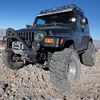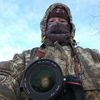"Do Pros Use Pro Gear?"
Jan 31, 2019 11:08:19 #
The only sure way to make money in photography is to sell your equipment.
Jan 31, 2019 12:22:30 #
le boecere wrote:
In today's post, Mike Johnston, The Online Photographer, wrote:
Final thought: in the art-photography world I came up in, it was said by some that changing cameras would set you back a year—that is, it was a year before the new camera fully became second nature and you knew it inside out.
I don't know how long it takes to get "the feel of the wheel" with a digital camera, but I'm betting it's a year or two longer than people typically keep them. Just kidding. :-) _mj
Final thought: in the art-photography world I came up in, it was said by some that changing cameras would set you back a year—that is, it was a year before the new camera fully became second nature and you knew it inside out.
I don't know how long it takes to get "the feel of the wheel" with a digital camera, but I'm betting it's a year or two longer than people typically keep them. Just kidding. :-) _mj
Every time I get a new body or a new lens, it takes me at least 2 weeks to find out how to make the most use of it and really know how to rapidly make changes. That's only because I stick with Canon bodies and lenses. I don't know how long it would take me to change brands and get to the same level of abilities.
As far as pro gear and what pro's use, some don't use pro gear. I know a guy that used a ProSumer body (Canon 7D) and he's a pro. At least that's what he was using 5 years ago when I first started shooting with him. Now he's upgraded to a 5D something. Not sure which model of 5D.
Jan 31, 2019 12:56:06 #
Switching brands I could see being a problem but not with the same maker. Went from a D7100 to D800 with no issues. Would be different jumping from a 3200 to D850 probably but little steps and the adjustment is easy.
Jan 31, 2019 13:12:12 #
Golf pros, baseball pros, football pros, etc., etc., etc., all use pro equipment. Why wouldn't photography pros? When our family had portraits taken by the local photo pro he used a 5x7 camera. That's a pro using pro equipment. The portrait sized print he did of my Dad in his Air Force uniform was terrific.
Jan 31, 2019 13:38:21 #
CHG_CANON wrote:
The only sure way to make money in photography is to sell your equipment.
IDK. I never get the more, or even the same as, than I paid for it!
Jan 31, 2019 13:45:46 #
bpulv
Loc: Buena Park, CA
CHG_CANON wrote:
The only sure way to make money in photography is to sell your equipment.
If you sell your equipment, you are probably selling if for less than you paid for it. So, is it really a sure way to make money?
Jan 31, 2019 13:51:11 #
Jan 31, 2019 13:55:21 #
HarryBinNC
Loc: Blue Ridge Mtns, No.Carolina, USA
jaymatt wrote:
I believe that Johnston has switched to Sony and states that he loves it and has no regrets.
No, he upgraded to the Panasonic/Lumix G9 - he is also very fond of Fujifilm. When upgrading this time, he wanted "In Body Stabilization" and the Lumix G9 he bought was significantly less costly than the Fuji X-H1, which is the only high-end Fuji body with stabilization. Both cameras are terrific. I was in the same boat, having earlier versions of both Lumix and Fujifilm cameras - I held out for the post-holiday sales and got the camera I really wanted (the X-H1) when it went on sale at a huge discount in mid-January.
Jan 31, 2019 14:34:35 #
Jan 31, 2019 14:40:57 #
sirlensalot
Loc: Arizona
I view Ansel Adams as more of an artist than a pro, but just the way I see and think about him. Although I know he worked under contract sometimes, I think of him as more of a photographic innovator of his chosen medium, much like Rembrandt.
To answer the OP specifically, I think the answer will always be yes.
The playing field today is so much different. A photographer skilled in PP techniques that adapts to the fast changing technology of software is king. One does not "make" the other, but they are complimentary. I think sought after "pro's" will use any brand and level of gear they are paid to use by manufacturers, not that it makes them any less a pro. Pro photographers may be the same as a sports figure in that sense. The better you become, the level of demand increases and the monetary rewards with it. Just the way I see it.
To answer the OP specifically, I think the answer will always be yes.
The playing field today is so much different. A photographer skilled in PP techniques that adapts to the fast changing technology of software is king. One does not "make" the other, but they are complimentary. I think sought after "pro's" will use any brand and level of gear they are paid to use by manufacturers, not that it makes them any less a pro. Pro photographers may be the same as a sports figure in that sense. The better you become, the level of demand increases and the monetary rewards with it. Just the way I see it.
Jan 31, 2019 14:54:30 #
It could be that pro photographers are not licensed or have certificates of achievment, but pro equipment is distinguishable from more "ordinary" equipment.
"Pro" equipment is built more ruggedly to withstand harder usage. It is built with more precision parts and designed so those parts will last longer (and can be replaced). "Pro" lenses are made to more exacting standards and in general have better performance in terms of corner sharpness and various distortions and aberrations.
"Pro" photographers (however you define them) use all sorts of equipment, both pro-level and consumer-level, and probably other equipment that isn't amenable to classification. Pro equipment can be used by anyone. For example I use pro-level camera bodies and lenses. I use Adobe software, which could be considered pro-level in my opinion. But I'm not a pro. I take my share (or maybe more) of useless photos. I don't make any money off of my hobby. But I enjoy the technological aspects of the pro-level gear.
The discussion of how to define a pro photographer comes up a half dozen times a year on all the forums I participate in. There are twice as many definitions of pro photographer as there are posters in the forums. I consider this a question without an answer, and moreover, a distinction that is unimportant.
"Pro" equipment is built more ruggedly to withstand harder usage. It is built with more precision parts and designed so those parts will last longer (and can be replaced). "Pro" lenses are made to more exacting standards and in general have better performance in terms of corner sharpness and various distortions and aberrations.
"Pro" photographers (however you define them) use all sorts of equipment, both pro-level and consumer-level, and probably other equipment that isn't amenable to classification. Pro equipment can be used by anyone. For example I use pro-level camera bodies and lenses. I use Adobe software, which could be considered pro-level in my opinion. But I'm not a pro. I take my share (or maybe more) of useless photos. I don't make any money off of my hobby. But I enjoy the technological aspects of the pro-level gear.
The discussion of how to define a pro photographer comes up a half dozen times a year on all the forums I participate in. There are twice as many definitions of pro photographer as there are posters in the forums. I consider this a question without an answer, and moreover, a distinction that is unimportant.
Jan 31, 2019 15:00:20 #
martinfisherphoto wrote:
90% of the time when a camera fails, doesn't capture the shot, ect.. it's user related. If your too lazy to learn your camera inside out, then shame on you. Most folks that own a camera are just spraying and praying. If your a Real photographer then even switching brands won't hold you back... To learn Every function or feature might take a few days, but please, a year???????
I don't look at it as "Shame on you!" if someone is too busy, or too uninterested to completely learn their cameras top to bottom. I think of it as "Good for me!", because there's less competition, in an already glutted field. Let photography naturally cull out, not the blurry images, but the blurry photographers.
So, no shame, in my opinion.
But, I totally know what you mean. LOL!
I have a friend who can afford the most expensive equipment the moment it comes out!
And you can guess how much of a skilled photographer he is.
Yet cameras today have very deep menus.
I know of no one so far, who knows how to program custom menus, and at the same time,
also uses, and knows how to use every feature available.
I only program and use what I want. Like assigning, assignable buttons, etc, etc. etc.
This same mindset goes for huge programs like, Photoshop / Lightroom.
No need to know the entire program.
Jan 31, 2019 15:24:14 #
E.L.. Shapiro wrote:
In photographic equipmet or supplies, the term&quo... (show quote)
Well said!
I was taught B&W developing, by a photographer friend in the late 70's.
We both hiked Point Lobos, and visited Mecca. (The Weston Gallery in Carmel )
We had 2 1/4s that never came off their tripods, slung over our shoulders,
relying on his Gossen Luna Pro for our exposure settings.
He had a Yashicaflex. I had the inferior Yashicamat.
My Dad lived in Pacific grove, and purchased the camera while the family was stationed in Japan.
I didn't know what I was doing. I only wanted fantastic results.
So, I just followed instruction from my friend.
Later, after teaching me the whole darkroom process, he turned me loose, all by myself
to develop my negatives and photographs.
His turned out way better!!
What brought back these musings, was your description of "Pro" equipment, and the following
camera examples! Aloha, from Maui! Coe
Jan 31, 2019 15:37:45 #
larryepage
Loc: North Texas area
DirtFarmer wrote:
It could be that pro photographers are not license... (show quote)
I agree with this response. I also am not a professional photographer, but appreciate the design and user interface on the professional, or borderline professional, cameras and lenses. I also have some consumer grade equipment, and while it performs well and is completely serviceable, there can be differences, sometimes important ones. A lens may not be sharp all the way to the corner. It may have a plastic mount instead of a metal one. It may not have an O-ring to seal more completely to the camera body. A zoom may not have a constant maximum aperture. A camera may require working through menus for relatively basic adjustments, rather than having an adjustment switch, button, or dial.
Much the same can be true in other areas...professional (or commercial) models of otherwise very similar computers may have more expansion slots available, or may have higher capacity power supplies. Professional laptops may have provisio.n for operation on a docking station, or may be more readily disassembled for service, or may have removable memory or drives for easier replacement or upgrade.
On the other hand, my niece graduated from college a couple of years ago with a degree in music. She is a professional pianist, and is very good at it. When we were talking once, the conversation turned to older pianos in not so great condition. She said that she was taught numerous times by numerous professors and private teachers that she was never to blame any piano for any problems or shortcomings, or to ever use the condition of a piano as an excuse. Her job was always to get the absolute best performance from any piano she was asked to play. Period. So any piano she happens to play is a professional piano.
I enjoy the privilege of getting to use good equipment as I play around with photography. It helps...sometimes a lot. There have been images that I have been able to capture which would have been impossible or at least extremely difficult without it. But I also know that there are folks who cold do a lot more with it than I can, at least right now. They could likely get more from my older equipment than I can get from my newer equipment. It doesn't matter.
Jan 31, 2019 16:09:50 #
I know both Pro Photographers and Hobbyists who have shot a Canon 5Dii. I guess they did not feel the need in either case for a 1D??.
I own two 4x5" film cameras and used to own a film 6x7cm camera, and I'm a hobbyist photographer. Advanced I'd guess.
I own two 4x5" film cameras and used to own a film 6x7cm camera, and I'm a hobbyist photographer. Advanced I'd guess.
If you want to reply, then register here. Registration is free and your account is created instantly, so you can post right away.






